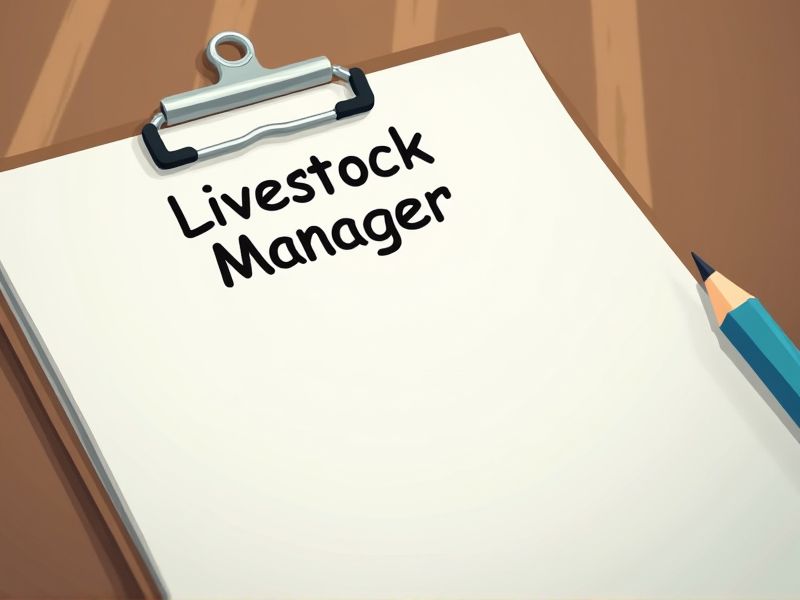
Livestock managers oversee complex operations that require specialized knowledge in animal husbandry, health management, and farm operations. Certification enhances expertise by providing evidence of proficiency in handling livestock and maintaining industry standards. Holding such credentials not only improves efficiency but also builds trust with stakeholders and regulatory bodies. Important certifications you may need as a Livestock Manager include those related to animal welfare and agricultural safety.
Certified Livestock Manager (CLM)
Certified Livestock Manager (CLM) programs are needed because they provide formal training on sustainable farming practices, ensuring livestock managers can maximize productivity while protecting the environment. Regulations around nutrient management and waste disposal have become stricter, and CLM certification equips managers with the necessary skills to comply with these laws. Efficient farm management directly impacts animal welfare and productivity, and CLM training focuses on improving these aspects through evidence-based practices. Data-driven insights from CLM programs help managers make informed decisions, reducing operational costs and increasing farm profitability.
Beef Quality Assurance (BQA) Certification
Livestock managers need Beef Quality Assurance (BQA) Certification to ensure adherence to established standards, promoting animal welfare and product safety. This certification equips managers with knowledge on proper cattle handling, which can reduce stress and prevent injuries in livestock. By following BQA guidelines, managers can enhance the marketability of their beef, meeting consumer demands for ethically and sustainably raised meat. Certification also leads to improved herd health and productivity, impacting profitability positively.
Dairy Herd Management Certification
Dairy Herd Management Certification enhances a livestock manager's expertise by providing evidence-based techniques for improving herd productivity and health. This certification ensures that managers are equipped with up-to-date knowledge on animal welfare standards and nutritional management. Access to advanced training aids in reducing operational costs and increasing milk yield efficiency. Certification also bolsters credibility, leading to better job prospects and trust from stakeholders in agricultural sectors.
Animal Welfare Certification
Animal welfare certification ensures that livestock managers adhere to standards that promote humane treatment, leading to healthier animals. Healthier animals often result in higher quality meat, milk, or other products, enhancing market competitiveness. Consumers increasingly demand ethically sourced products, and certification meets this market expectation. Certification can also mitigate risks associated with animal stress and disease, reducing potential economic losses for producers.
Livestock Nutrition Specialist Certification
Livestock Nutrition Specialist Certification equips a livestock manager with advanced knowledge to optimize animal diets, which directly enhances productivity and health. It ensures that the manager can effectively balance nutrients to prevent deficiencies and diseases, leading to reduced veterinary costs. Certified managers can apply evidence-based strategies that result in better growth rates and reproductive performance. This certification also reassures stakeholders about the manager's commitment to sustainable and efficient farm management practices.
Sustainable Livestock Production Certification
Sustainable Livestock Production Certification enhances credibility by demonstrating a commitment to environmentally friendly and ethical farming practices. It helps livestock managers meet increasing consumer demand for sustainably sourced products. The certification can lead to improved market access and potentially higher prices for certified products. Compliance with sustainable standards often results in better resource management, which can reduce costs and increase efficiency.
Animal Genetics and Breeding Certification
Animal Genetics and Breeding Certification equips livestock managers with the knowledge to improve genetic traits in their herds, leading to enhanced productivity. Accurate understanding of genetics aids in making informed breeding decisions, reducing genetic disorders and improving animal health. Certification ensures managers stay updated with the latest technologies and methodologies, optimizing breeding programs. Such expertise is crucial for maintaining biodiversity and achieving sustainable livestock production.
Agricultural Business Management Certification
Obtaining an Agricultural Business Management Certification enhances a livestock manager's ability to optimize operational efficiency. The certification provides essential skills in financial planning and resource allocation, crucial for managing costs and increasing profitability. Understanding business concepts helps in strategic decision-making, such as market positioning and product differentiation in a competitive agricultural sector. It also equips managers with knowledge of sustainable practices, ensuring compliance with environmental regulations and contributing to long-term business sustainability.
Farm Safety and Biosecurity Certification
Ensuring farm safety and biosecurity certification reduces the risk of disease outbreaks, which can significantly impact livestock health and productivity. It enhances consumer confidence by demonstrating adherence to high standards, fostering trust in agricultural products. Compliance with safety and biosecurity measures often leads to improved farm management practices, contributing to overall operational efficiency. Meeting certification standards can open new market opportunities, as many buyers and retailers prefer or require certified suppliers.
Environmental Stewardship in Livestock Production Certification
Environmental Stewardship in Livestock Production Certification ensures livestock managers adhere to sustainable practices, which helps reduce negative impacts on ecosystems. Certification provides a framework that encourages efficient resource use, resulting in lower greenhouse gas emissions and improved water quality. Managers with this certification often implement practices that enhance animal welfare and promote biodiversity, leading to healthier livestock and ecosystems. As consumers increasingly demand transparency and sustainability, certified managers find themselves better positioned in the marketplace.
Summary
When you earn certifications as a Livestock Manager, you enhance your knowledge and skills, which leads to improved livestock productivity. This results in increased operational efficiency and profitability for farms. Certified managers often become more capable of implementing best practices and sustainable techniques. Employers may recognize your value, which can lead to career advancement opportunities.
